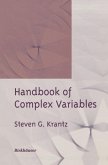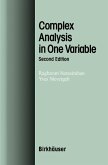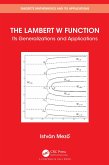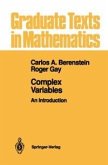The engaging exposition is replete with discussions, remarks, questions, and exercises, motivating not only understanding on the part of the reader, but also developing the tools needed to think critically about mathematical problems. This focus involves a careful examination of the methods and assumptions underlying various alternative routes thatlead to the same destination.
The material includes numerous examples and applications relevant to engineering students, along with some techniques to evaluate various types of integrals. The book may serve as a text for an undergraduate course in complex variables designed for scientists and engineers or for mathematics majors interested in further pursuing the general theory of complex analysis. The only prerequisite is a basic knowledge of advanced calculus. The presentation is also ideally suited for self-study.
Dieser Download kann aus rechtlichen Gründen nur mit Rechnungsadresse in A, B, BG, CY, CZ, D, DK, EW, E, FIN, F, GR, HR, H, IRL, I, LT, L, LR, M, NL, PL, P, R, S, SLO, SK ausgeliefert werden.









